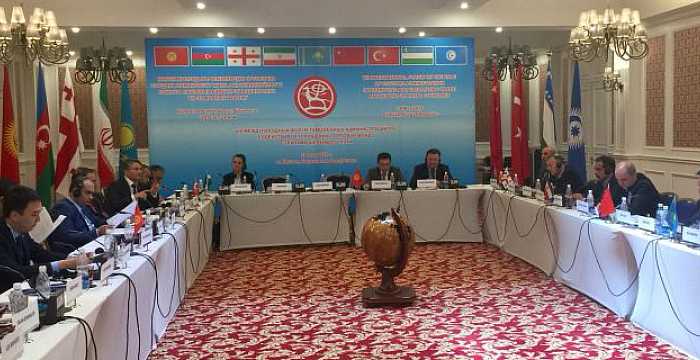Organized by the State Customs Service under Government of Kyrgyz Republic, the 8th International Forum on the Role of Customs Administrations on Promoting and Facilitating Trade among Silk Road countries was convened on 24 May 2018 in Bishkek with the participation of delegations of the Silk Road countries and the Turkic Council.
The forum was inaugurated by the opening statements of the Heads of the delegations of the Silk Road countries and the Turkic Council.
In his opening statement Project Director of the Turkic Council Farid Damirli emphasized on the importance of the work of Customs Administrations as they play a key role in facilitating trade among countries. He also underlined the importance of the support of customs authorities for modern, electronic based, streamlined customs procedures in order to bring the concrete outcomes.
At the 4th session of the Forum which was dedicated to the cooperation perspectives within the Turkic Council, Project Director Özge Pan informed in detail the participating delegations with a presentation on the background of the customs cooperation, accomplishments registered and the future projects of the Turkic Council. In her presentation, she highlighted the comprehensive perspective through which the Turkic Council approach and treats the customs cooperation among its Members and in that regard stressed the importance of Middle Corridor and implementation of customs measures that further facilitate trade flows in the Corridor.
At the end of the Forum, a joint declaration was adopted by the delegations in which they expressed common willingness to develop cooperation in the field of the exchange of preliminary and other information; to strengthen cooperation between the countries of the Silk Road through the implementation and coordination of important projects such as the "Caravanserai Project” and "One Belt One Road", as well as other significant initiatives in the region; to implement various best practices and mechanisms available for trade facilitation; to direct efforts for modernizing the existing infrastructure of checkpoints and introduce high-tech equipment for customs clearance to expedite customs formalities at the border; to take measures for mutual recognition of AEOs; to improve the efficiency of transport corridors by applying effective customs control measures to accelerate the movement of goods.








